新概念英语第二册非谓语动词之过去分词(共20张PPT)
文档属性
| 名称 | 新概念英语第二册非谓语动词之过去分词(共20张PPT) |  | |
| 格式 | zip | ||
| 文件大小 | 380.0KB | ||
| 资源类型 | 教案 | ||
| 版本资源 | 新概念英语 | ||
| 科目 | 英语 | ||
| 更新时间 | 2023-02-17 16:32:45 | ||
图片预览

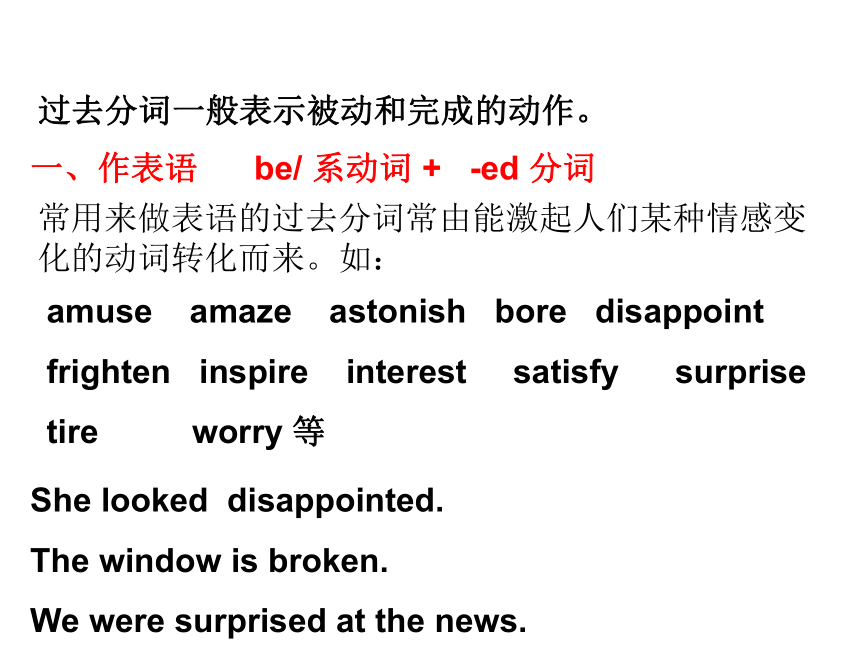
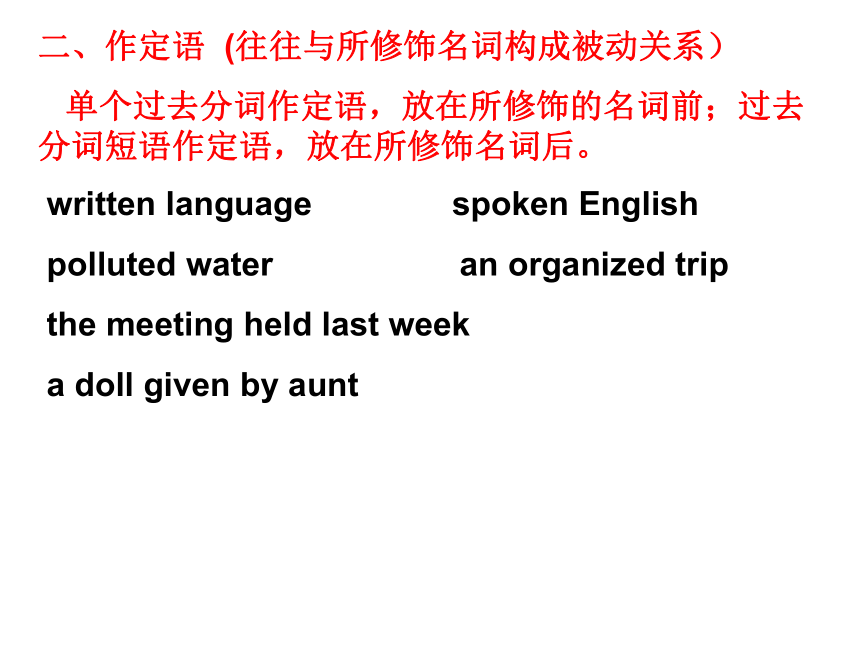
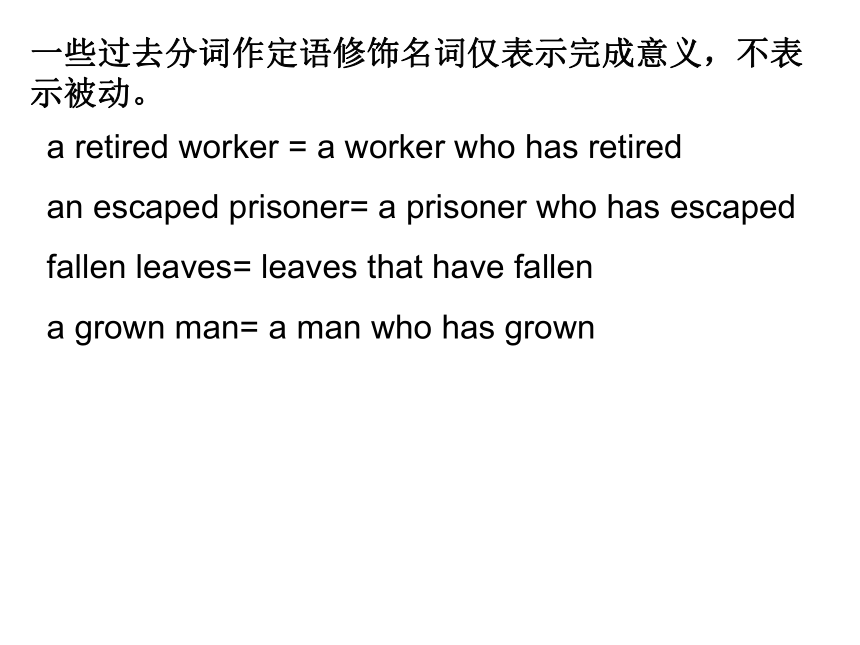

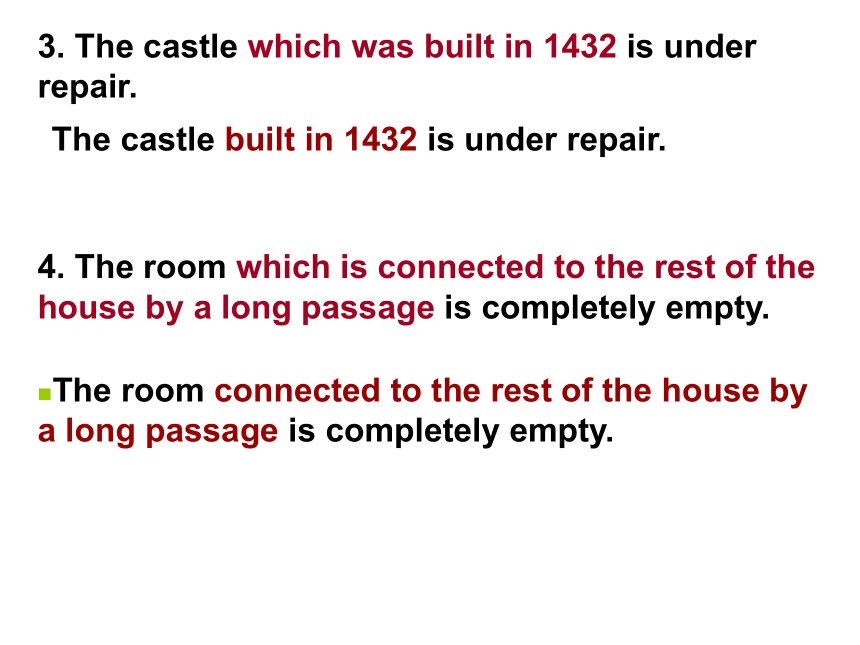
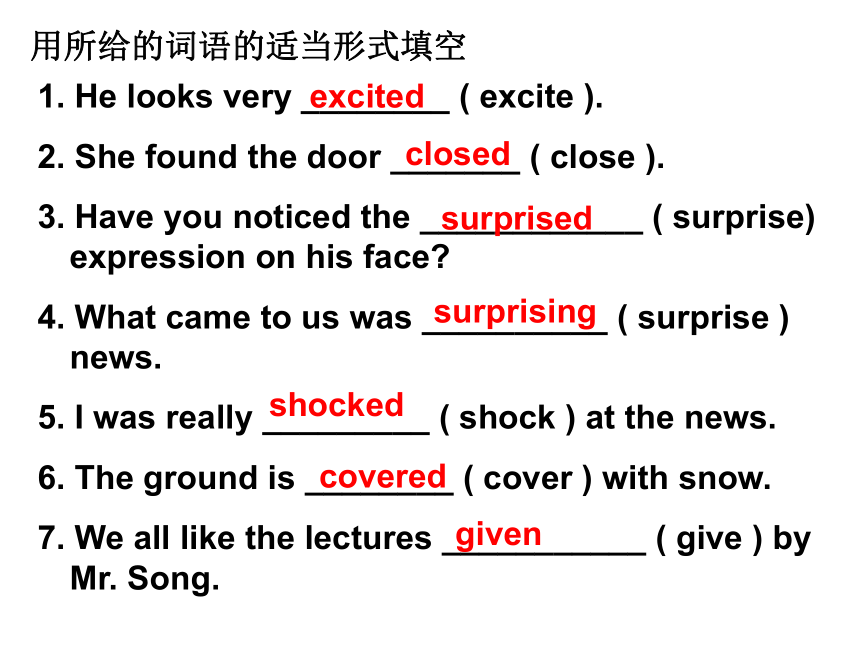
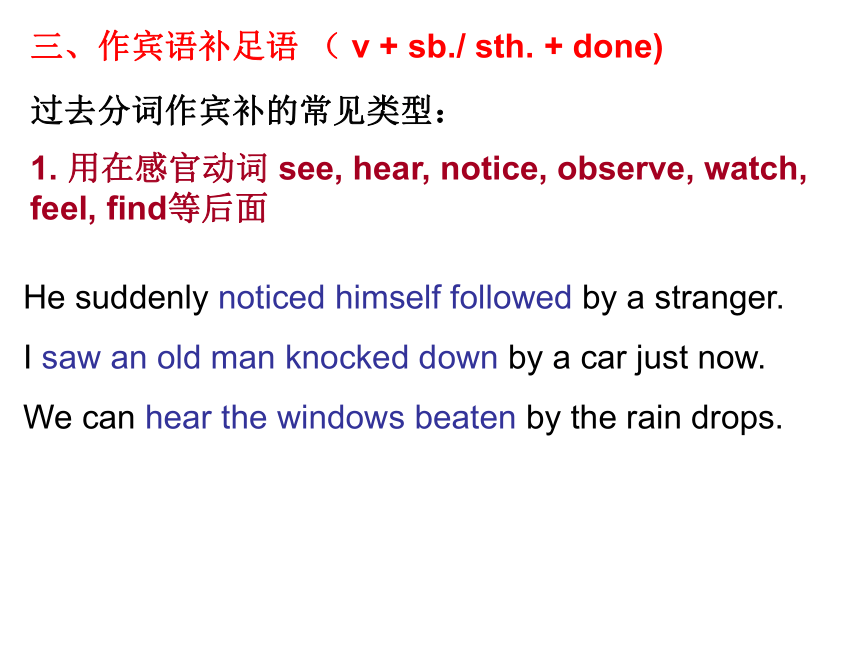
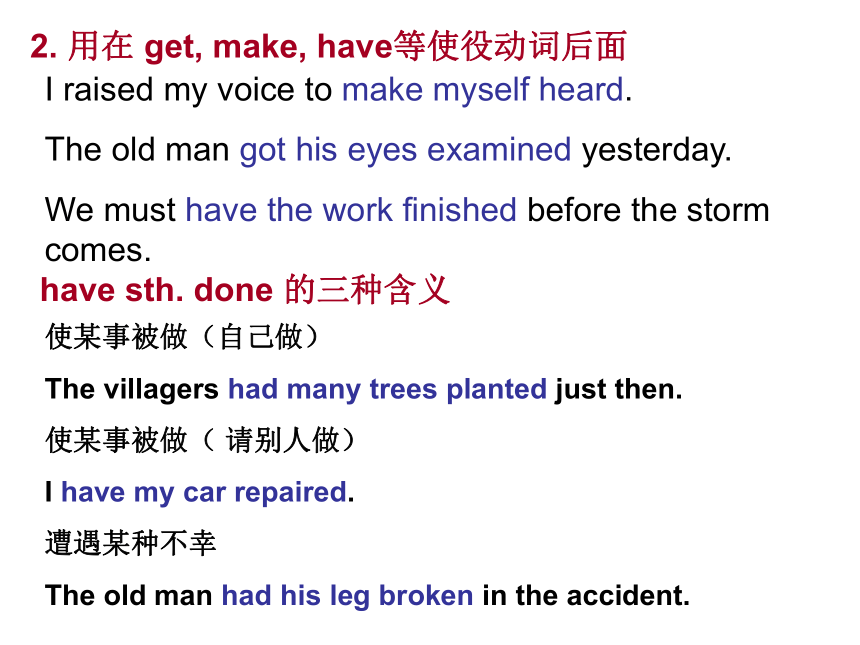
文档简介
(共20张PPT)
非谓语动词之过去分词
过去分词一般表示被动和完成的动作。
一、作表语 be/ 系动词 + -ed 分词
常用来做表语的过去分词常由能激起人们某种情感变化的动词转化而来。如:
amuse amaze astonish bore disappoint
frighten inspire interest satisfy surprise
tire worry 等
She looked disappointed.
The window is broken.
We were surprised at the news.
二、作定语 (往往与所修饰名词构成被动关系)
单个过去分词作定语,放在所修饰的名词前;过去分词短语作定语,放在所修饰名词后。
written language spoken English
polluted water an organized trip
the meeting held last week
a doll given by aunt
一些过去分词作定语修饰名词仅表示完成意义,不表示被动。
a retired worker = a worker who has retired
an escaped prisoner= a prisoner who has escaped
fallen leaves= leaves that have fallen
a grown man= a man who has grown
过去分词短语作定语,相当于一个定语从句,但它比定语从句结构更简洁。
将下列定语从句改成过去分词短语作定语的句子。
1. Soon we lost sight of that famous astronomer who is called Li Qiang.
2. I am going to buy a painting which is copied from Vincent van Gogh.
Soon we lost sight of that famous astronomer called Li Qiang.
I am going to buy a painting copied from Vincent van Gogh.
3. The castle which was built in 1432 is under repair.
4. The room which is connected to the rest of the house by a long passage is completely empty.
The castle built in 1432 is under repair.
The room connected to the rest of the house by a long passage is completely empty.
用所给的词语的适当形式填空
1. He looks very ________ ( excite ).
2. She found the door _______ ( close ).
3. Have you noticed the ____________ ( surprise) expression on his face
4. What came to us was __________ ( surprise ) news.
5. I was really _________ ( shock ) at the news.
6. The ground is ________ ( cover ) with snow.
7. We all like the lectures ___________ ( give ) by Mr. Song.
excited
closed
surprised
surprising
shocked
covered
given
三、作宾语补足语 ( v + sb./ sth. + done)
过去分词作宾补的常见类型:
1. 用在感官动词 see, hear, notice, observe, watch, feel, find等后面
He suddenly noticed himself followed by a stranger.
I saw an old man knocked down by a car just now.
We can hear the windows beaten by the rain drops.
2. 用在 get, make, have等使役动词后面
I raised my voice to make myself heard.
The old man got his eyes examined yesterday.
We must have the work finished before the storm comes.
have sth. done 的三种含义
使某事被做(自己做)
The villagers had many trees planted just then.
使某事被做( 请别人做)
I have my car repaired.
遭遇某种不幸
The old man had his leg broken in the accident.
3. 用在keep, leave 等表示“使…处于(某种状态)的词后面
They kept the door locked for a long time.
He passed away, leaving his works unfinished.
4. 用在expect, would like, want, wish, order等表示”愿望,命令“的词后面
The teacher wouldn’t like the problem discussed at the moment.
I wish the papers handed out soon.
5. with + sb./ sth. + done 的用法
With everything bought, he left the store and went home.
The murder was brought in, with his hands tied behind his back.
With the water heated, we can see the steam.
表示被动,已发生
表示主动 (正在发生)
(主动或被动)表示未发生
With his homework finished, he could go out to play.
With so much work filling my mind, I almost break down.
With much homework to do, I can't go out with you tonight.
用适当形式填空
1.The old man got his old house _______ ( pull) down.
2. He found his valuable watch _______ ( steal ).
3. The speaker raised his voice but couldn’t make himself _________ ( hear ).
4. With everything well _______ ( arrange ), he left the office.
5. He had his pocket _______ (pick ) in the supermarket.
6. All of us saw the boy _______ (break) the window.
pulled
stolen
heard
arranged
picked
broken
I wish the work ______ this week.
A. finish B. finished
C. to finish D. finishing
2. We had had the machine ______ before you came.
A. repairing B. it repaired
C. repaired D. to be repaired
3. The boy had his leg _____ by the dog when he was playing with it.
A. bit B. biting
C. bitten D. to bite
4. Seeing his house ______ and many things _____, he dialed 110 at once.
A. broken into; stealing B. broken into; stolen
C. breaking into; stolen D. breaking into; stealing
5. Don’t leave the water _____ while you brush your teeth.
A. run B. running
C. being run D. to run
四、作状语 (逻辑主语和主句主语一致)
1. 作时间状语 (相当于when引导的从句)
Seen from the hill, the park looks beautiful.
Asked who she was, she said she was Mr. John’s friend.
2. 作原因状语(相当于because,as等引导的从句)
Frightened by the loud noise, I went out to see what was happening.
Deeply moved by the story, the excited people stopped arguing with each other.
3. 作条件状语 ( 相当于if 引导的从句)
Given more time, we could do it much better.
Heated, water changes into steam.
4. 作让步状语(相当于though,although等引导)
Defeated for a second time, he still didn’t give in.
5. 作方式或伴随状语
The man entered the room, followed by a dog.
过去分词作状语时,前面往往带有when, if, while, though, even if等连词,这样就能是过去分词所表示的意思更加明确。
Even if invited, I won’t go.
When compared with the size of the whole earth, the biggest ocean does not seem big at all.
1._____ by the beauty of nature, the girl form London decided to spend another two days on the farm.
A. Attracting B. Attracted
C. To be attracted D. Having attracted
2. ______ time, he’ll make a first-class tennis player.
A. Having given B. To given
C. Giving D. Given
3. ______ with so much trouble, we failed to complete the task on time.
A. Faced B. Face C. Facing D. To face
4. ______ in his task, the old man didn’t notice the woman enter his office.
A. Absorbed B. Absorbing
C. Absorbs D. To absorb
5. Though _____ of the danger, he still went skating on the thin ice.
A. warning B. to warn
C. warn D. warned
非谓语动词之过去分词
过去分词一般表示被动和完成的动作。
一、作表语 be/ 系动词 + -ed 分词
常用来做表语的过去分词常由能激起人们某种情感变化的动词转化而来。如:
amuse amaze astonish bore disappoint
frighten inspire interest satisfy surprise
tire worry 等
She looked disappointed.
The window is broken.
We were surprised at the news.
二、作定语 (往往与所修饰名词构成被动关系)
单个过去分词作定语,放在所修饰的名词前;过去分词短语作定语,放在所修饰名词后。
written language spoken English
polluted water an organized trip
the meeting held last week
a doll given by aunt
一些过去分词作定语修饰名词仅表示完成意义,不表示被动。
a retired worker = a worker who has retired
an escaped prisoner= a prisoner who has escaped
fallen leaves= leaves that have fallen
a grown man= a man who has grown
过去分词短语作定语,相当于一个定语从句,但它比定语从句结构更简洁。
将下列定语从句改成过去分词短语作定语的句子。
1. Soon we lost sight of that famous astronomer who is called Li Qiang.
2. I am going to buy a painting which is copied from Vincent van Gogh.
Soon we lost sight of that famous astronomer called Li Qiang.
I am going to buy a painting copied from Vincent van Gogh.
3. The castle which was built in 1432 is under repair.
4. The room which is connected to the rest of the house by a long passage is completely empty.
The castle built in 1432 is under repair.
The room connected to the rest of the house by a long passage is completely empty.
用所给的词语的适当形式填空
1. He looks very ________ ( excite ).
2. She found the door _______ ( close ).
3. Have you noticed the ____________ ( surprise) expression on his face
4. What came to us was __________ ( surprise ) news.
5. I was really _________ ( shock ) at the news.
6. The ground is ________ ( cover ) with snow.
7. We all like the lectures ___________ ( give ) by Mr. Song.
excited
closed
surprised
surprising
shocked
covered
given
三、作宾语补足语 ( v + sb./ sth. + done)
过去分词作宾补的常见类型:
1. 用在感官动词 see, hear, notice, observe, watch, feel, find等后面
He suddenly noticed himself followed by a stranger.
I saw an old man knocked down by a car just now.
We can hear the windows beaten by the rain drops.
2. 用在 get, make, have等使役动词后面
I raised my voice to make myself heard.
The old man got his eyes examined yesterday.
We must have the work finished before the storm comes.
have sth. done 的三种含义
使某事被做(自己做)
The villagers had many trees planted just then.
使某事被做( 请别人做)
I have my car repaired.
遭遇某种不幸
The old man had his leg broken in the accident.
3. 用在keep, leave 等表示“使…处于(某种状态)的词后面
They kept the door locked for a long time.
He passed away, leaving his works unfinished.
4. 用在expect, would like, want, wish, order等表示”愿望,命令“的词后面
The teacher wouldn’t like the problem discussed at the moment.
I wish the papers handed out soon.
5. with + sb./ sth. + done 的用法
With everything bought, he left the store and went home.
The murder was brought in, with his hands tied behind his back.
With the water heated, we can see the steam.
表示被动,已发生
表示主动 (正在发生)
(主动或被动)表示未发生
With his homework finished, he could go out to play.
With so much work filling my mind, I almost break down.
With much homework to do, I can't go out with you tonight.
用适当形式填空
1.The old man got his old house _______ ( pull) down.
2. He found his valuable watch _______ ( steal ).
3. The speaker raised his voice but couldn’t make himself _________ ( hear ).
4. With everything well _______ ( arrange ), he left the office.
5. He had his pocket _______ (pick ) in the supermarket.
6. All of us saw the boy _______ (break) the window.
pulled
stolen
heard
arranged
picked
broken
I wish the work ______ this week.
A. finish B. finished
C. to finish D. finishing
2. We had had the machine ______ before you came.
A. repairing B. it repaired
C. repaired D. to be repaired
3. The boy had his leg _____ by the dog when he was playing with it.
A. bit B. biting
C. bitten D. to bite
4. Seeing his house ______ and many things _____, he dialed 110 at once.
A. broken into; stealing B. broken into; stolen
C. breaking into; stolen D. breaking into; stealing
5. Don’t leave the water _____ while you brush your teeth.
A. run B. running
C. being run D. to run
四、作状语 (逻辑主语和主句主语一致)
1. 作时间状语 (相当于when引导的从句)
Seen from the hill, the park looks beautiful.
Asked who she was, she said she was Mr. John’s friend.
2. 作原因状语(相当于because,as等引导的从句)
Frightened by the loud noise, I went out to see what was happening.
Deeply moved by the story, the excited people stopped arguing with each other.
3. 作条件状语 ( 相当于if 引导的从句)
Given more time, we could do it much better.
Heated, water changes into steam.
4. 作让步状语(相当于though,although等引导)
Defeated for a second time, he still didn’t give in.
5. 作方式或伴随状语
The man entered the room, followed by a dog.
过去分词作状语时,前面往往带有when, if, while, though, even if等连词,这样就能是过去分词所表示的意思更加明确。
Even if invited, I won’t go.
When compared with the size of the whole earth, the biggest ocean does not seem big at all.
1._____ by the beauty of nature, the girl form London decided to spend another two days on the farm.
A. Attracting B. Attracted
C. To be attracted D. Having attracted
2. ______ time, he’ll make a first-class tennis player.
A. Having given B. To given
C. Giving D. Given
3. ______ with so much trouble, we failed to complete the task on time.
A. Faced B. Face C. Facing D. To face
4. ______ in his task, the old man didn’t notice the woman enter his office.
A. Absorbed B. Absorbing
C. Absorbs D. To absorb
5. Though _____ of the danger, he still went skating on the thin ice.
A. warning B. to warn
C. warn D. warned
同课章节目录
